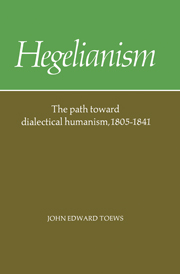Book contents
- Frontmatter
- Contents
- Preface
- Introduction: the Hegelian project in ideological perspective
- PART I PHILOSOPHY AND CULTURAL INTEGRATION: HEGEL IN CONTEXT
- 1 The origins of the Hegelian project: tensions in the father's world
- 2 Revolution and Romanticism: the generational context of Hegel's ideology of cultural integration
- 3 The reconciliation of Reason and reality: Hegel's differentiation from Romanticism
- PART II THE HISTORICAL APPROPRIATION OF THE ABSOLUTE: UNITY AND DIVERSITY IN THE HEGELIAN SCHOOL, 1805–1831
- PART III THE REDUCTION OF THE ABSOLUTE TO “MAN”: THE DIVISION OF THE SCHOOL AND THE EMERGENCE OF THE HEGELIAN LEFT, 1830–1841
- EPILOGUE: BEYOND “MAN” – THE RISE AND FALL OF LEFT HEGELIAN HUMANISM
- Notes
- Bibliography
- Index
2 - Revolution and Romanticism: the generational context of Hegel's ideology of cultural integration
Published online by Cambridge University Press: 08 January 2010
- Frontmatter
- Contents
- Preface
- Introduction: the Hegelian project in ideological perspective
- PART I PHILOSOPHY AND CULTURAL INTEGRATION: HEGEL IN CONTEXT
- 1 The origins of the Hegelian project: tensions in the father's world
- 2 Revolution and Romanticism: the generational context of Hegel's ideology of cultural integration
- 3 The reconciliation of Reason and reality: Hegel's differentiation from Romanticism
- PART II THE HISTORICAL APPROPRIATION OF THE ABSOLUTE: UNITY AND DIVERSITY IN THE HEGELIAN SCHOOL, 1805–1831
- PART III THE REDUCTION OF THE ABSOLUTE TO “MAN”: THE DIVISION OF THE SCHOOL AND THE EMERGENCE OF THE HEGELIAN LEFT, 1830–1841
- EPILOGUE: BEYOND “MAN” – THE RISE AND FALL OF LEFT HEGELIAN HUMANISM
- Notes
- Bibliography
- Index
Summary
“It is surely not difficult to see that our time is a time of birth and transition to a new period,” Hegel wrote in 1807. “Spirit has broken with the world as it has hitherto existed and with the old ways of thinking, and is about to let all this sink into the past; it is at work giving itself a new form.” When Hegel made this claim he had already differentiated his own conception of the “new form” of “spirit” from the cultural perspectives of other members of his generation and reduced their positions to limited “Moments” in the transition from the old to the new world. The unique aspects of Hegel's viewpoint that eventually led to the formation of a distinctive Hegelian school, however, only gradually emerged in the years between 1802 and 1807 as a particular variant of a more general intellectual transformation. The basic intellectual framework in which Hegel conceived the process of cultural revolution and the vocation of the intellectual was snared by the other prominent intellectuals of his generation – Schelling, Hölderlin, Schleiermacher, the Schlegels, the Humboldts, Novalis, Tieck, and Niebuhr – and this common framework was the product of the shared experience of an epochal break during the 1790s with “the world as it has hitherto existed, and with the old ways of thinking.”
- Type
- Chapter
- Information
- HegelianismThe Path Toward Dialectical Humanism, 1805–1841, pp. 30 - 48Publisher: Cambridge University PressPrint publication year: 1981



